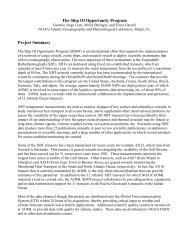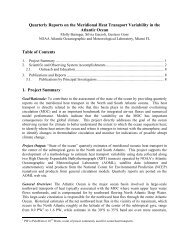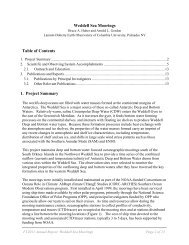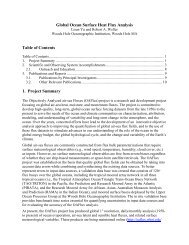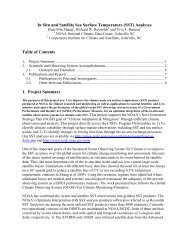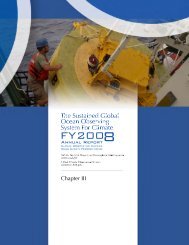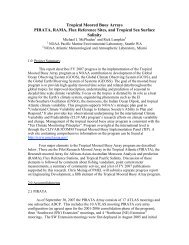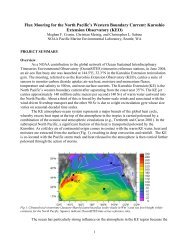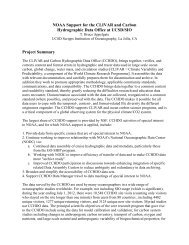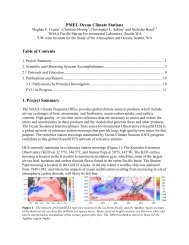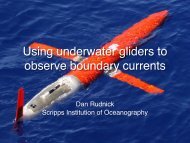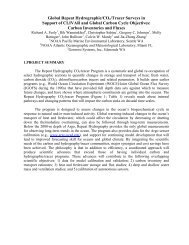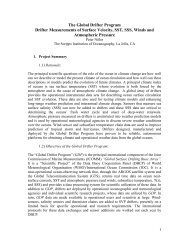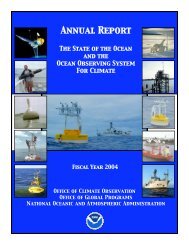GCOS Implementation Plan - WMO
GCOS Implementation Plan - WMO
GCOS Implementation Plan - WMO
You also want an ePaper? Increase the reach of your titles
YUMPU automatically turns print PDFs into web optimized ePapers that Google loves.
<strong>Implementation</strong> <strong>Plan</strong> for the Global Observing System for Climate in Support of the UNFCCC<br />
(2010 Update)<br />
• Lack of developing and sharing in situ databases, ocean colour radiances and derived products of<br />
sufficient quality to use for calibrating and validating satellite data products.<br />
• Difficulty of sustaining projects for cross-calibrating and merging OCR data across satellite<br />
sensors to support global and regional scientific data products.<br />
• Need for continued research and technology development efforts to provide new and improved<br />
OCR data streams, algorithms and products, particularly for complex Case 2 waters.<br />
To address the issues raised above, <strong>GCOS</strong> and GOOS are supporting the plans being developed<br />
through participating CEOS space agencies to implement an Ocean Colour Radiometry Virtual<br />
Constellation. The International Ocean Colour Coordinating Group (IOCCG), acting for GOOS and<br />
<strong>GCOS</strong>, will give oversight to ensure the measurements are implemented in accordance with GCMPs<br />
and the requirements outlined in the Satellite Supplement to the IP-04, as well as to promote<br />
associated research.<br />
Action O15 [IP-04 O18]<br />
Action: Implement continuity of ocean colour radiance datasets through the plan for an Ocean<br />
Colour Radiometry Virtual Constellation.<br />
Who: CEOS space agencies, in consultation with IOCCG and GEO.<br />
Time-Frame: Implement plan as accepted by CEOS agencies in 2009.<br />
Performance Indicator: Global coverage with consistent sensors operating according to the<br />
GCMPs; flow of data into agreed archives.<br />
Annual Cost Implications: 30-100M US$ (10% in non-Annex-I Parties).<br />
ECV – Sea State<br />
Observations of sea state are particularly relevant to coastal and offshore impacts on human<br />
activities, but also affect climatically important air-sea exchanges and can also provide<br />
complementary information of relevance to monitoring changes in the marine environment, e.g., in<br />
winds, storms, air-sea fluxes and extreme events. Although sea state (variables relating to the height,<br />
direction, wavelength and time period of waves) has been observed from satellites, there is at present<br />
no coordinated and sustained global observing effort for sea state. Present best estimates of sea<br />
state are computed from model reanalysis and analysis systems.<br />
Observing networks, satellites and analysis activities contributing various parameters to the<br />
knowledge of regional and global sea state include:<br />
• Numerical weather prediction (indirect) estimates.<br />
• Reference mooring network.<br />
• Satellite altimetry.<br />
• Satellite Synthetic Aperture Radar (SAR).<br />
• VOS visual.<br />
Issues relative to sea state observations and analysis include:<br />
• The accuracy of NWP products is limited by the availability of validation and calibration data, and<br />
their utility is limited over the shallower coastal regions. Reliable surface wind data (observations<br />
and reanalyses) are essential. For example, the ECMWF ERA40 made use of sea state estimates<br />
within its assimilation system.<br />
• The existing sea state reference buoys are limited in terms of global distribution and location (few<br />
open ocean sites and insufficient coastal measurements), and are not collocated with other ECV<br />
reference sites.<br />
• Altimetry only provides significant wave height and wave period, and coverage is limited relative<br />
to synoptic scales of variability. SAR gives the most useful data but is rarely exchanged or<br />
available in a way that impacts estimates for climate.<br />
To address the issues raised above, it is proposed that the JCOMM Expert Team on Waves and<br />
Surges implement wave measurement systems as part of the Surface Reference Mooring Network.<br />
87



